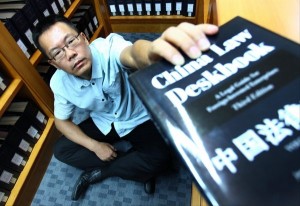Ian Johnson
 May Tse/South China Morning Post
May Tse/South China Morning Post
Human Rights lawyer Teng Biao
Teng Biao is one of China’s best-known civil-rights lawyers, and a prominent member of the weiquan, or “rights defenders,” movement, a loosely knit coalition of Chinese lawyers and activists who tackle cases related to the environment, religious freedom, and freedom of speech and the press. He came to national attention in 2003 when he and two other young Peking University law students successfully petitioned parliament to end the “custody and repatriation” law that gave police sweeping power to detain people for failing to have a residence permit or valid ID. The issue had come to national attention after a twenty-seven-year-old university graduate was beaten for failing to have proper identity papers.
Teng, who is 41, is also a founder of gongmeng, the Open Constitution Initiative, a group of lawyers and academics who argue for greater rule of law and constitutional protections, and the New Citizens Movement, a broader group of civil rights activists. He is a lecturer at the University of Politics and Law in Beijing but has been banned from teaching since 2009 because of his political activities He is currently a fellow at Harvard Law School. I met him in Berlin in late August, a few days before he left for the United States.
Ian Johnson: This week, the Chinese Communist Party is staging its annual plenum—that much-watched event in which hundreds of members of the party’s central committee gather to discuss policy. This year’s theme is supposed to be “governing the country according to law.” Do you expect any significant changes to come of it?
Teng Biao: I don’t care what they talk about; I don’t expect anything. For the past two years they’ve arrested more than three-hundred human rights defenders and intellectuals, such as Pu Zhiqiang, Tang Jingling, and Ilham Tohti. And they have destroyed many Christian churches, they cracked down on the Internet, and they published a series of articles against universal values [an expression for human rights, civil liberties and other values that are enshrined in international law but often criticized in China as Western], constitutionalism, and judicial independence. With such actions, they can’t have meaningful reform of the legal system.
